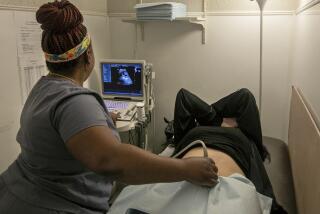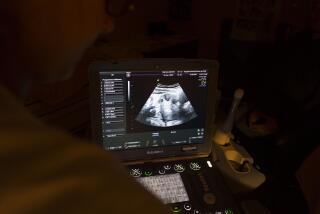Wider Options in Prenatal Tests : Personal health: Not all prospective parents know they have a choice of screening procedures during pregnancy. Two of the exams provide results much earlier.
- Share via
Five years ago, pregnant with her first child at age 35, Mary DeMartinif was told by her doctor to undergo amniocentesis. At the time, it was the only proven procedure available to test for fetal genetic or chromosomal abnormalities that cause serious birth defects, such as mental retardation.
Now expecting a second child, she and husband Tim O’Brien had the choice of three prenatal tests. Besides standard amniocentesis--performed between the 14th and 18th weeks of pregnancy--some physicians offer early amniocentesis, from 11 to 14 weeks, and chorionic villus sampling (CVS), from 9 to 11 weeks.
DeMartinif and O’Brien stayed with standard amniocentesis.
However, advocates of early prenatal testing say they are concerned that not all couples are offered such a choice. Among the reasons they cite are:
* Some women do not see their obstetricians until it’s too late to perform early amniocentesis or CVS.
* Physicians might not offer the range of prenatal tests or do not refer women to centers that do.
* Some physicians favor amniocentesis because it has been in use for almost two decades, and they are less certain about the safety of newer procedures.
* Many insurers have guidelines restricting coverage of prenatal tests. For example, Medi-Cal does not cover CVS although the procedure is no longer considered experimental. Health insurers are traditionally more conservative in approving new treatments for coverage.
Amniocentesis involves inserting a fine needle through the abdomen into the uterus to withdraw some fluid surrounding the fetus. The fluid contains cells shed from the fetus, which can be tested for genetic disorders. Early amniocentesis is the same procedure performed about a month sooner.
In CVS, a small catheter is placed through the cervix or abdomen to collect a sample of placental tissue. Fetal cells that make up the placenta then are tested.
Based on a wealth of scientific data released during the last year, medical experts agree that although not risk-free, each test is effective and safe for the fetus--to varying degrees. And many suggest that testing during the first trimester of pregnancy will become a common practice, replacing standard amniocentesis. Still, the medical community has not yet embraced all three procedures.
“Not everybody offers the full spectrum of prenatal tests,” says Carole Hansult, a Los Angeles genetic counselor. “Some doctors do not know that the risks of CVS have gone down and that there are some very skilled physicians who do these procedures. In that way, the choice is really removed for patients.”
Dr. Laird Jackson, a CVS specialist Jefferson Medical College in Philadelphia, says part of the problem is that CVS and early amniocentesis are newer and not widely practiced, and many obstetricians have no experience with newer methods:
“If you try to take something that has been performed for 15 years and compare it against something that has been done for only a few years, you’re going to feel more comfortable with the older procedure. I think biases will disappear as people become experienced in doing either (CVS or amniocentesis).”
Each of the three tests can cause miscarriage. But not all experts agree on how significant the risks are, Jackson says. Only a few studies have compared the three.
Calculating the small risk is complicated by natural miscarriages during the first trimester, says Dr. Manuel Porto, a specialist in high-risk pregnancy at UC Irvine.
“The overall risk of losing the pregnancy with any procedure we do is relatively low,” says Porto, who performs all three procedures. “So it takes huge numbers of patients to sort out what may be a real difference. The earlier we do something, the likelier we are to run into spontaneous fetal loss.”
The bottom line, says Dr. Robert Z. Gergely, director of the Maternal-Fetal Testing Center in Los Angeles: “The earlier you do it, the less information you get and the higher the risk.”
Since CVS and early amniocentesis are the newest procedures, both are usually compared to standard amniocentesis.
Studies performed recently by the National Institute of Child Health and Human Development Study and Canadian researchers concluded CVS was safe and effective, and had a slightly higher rate of fetal loss than amniocentesis.
Most studies have found that about one in 100 women undergoing CVS miscarry due to the procedure. Jackson, who directed a large, government-funded study comparing the techniques, does not believe the risk to be that high.
But the procedure also has a clear advantage: It can be performed up to six weeks before amniocentesis--before a woman is beginning to look pregnant--thus affording a couple privacy regarding reproductive decisions. If a serious abnormality is found, a woman then has the option of abortion in the first trimester, which is safer and less traumatic.
By the time results are available with standard amniocentesis, a woman may be in her 18th or 19th week of pregnancy, when it is evident and the attachment to the fetus has deepened.
A disadvantage of CVS is that women who undergo the test must also have a blood test (alpha-fetoprotein test) later in the pregnancy to detect spinal-cord defects.
But as scientists discover which hereditary diseases are linked to particular chromosomes and genes, the value of CVS might increase. A CVS sample produces more DNA tissue--the material that carries all genetic information--than does amniocentesis, Porto says.
Despite the initial excitement about CVS as an alternative to amniocentesis, many couples choose early amniocentesis because it can be performed almost as early and has advantages over CVS, Gergely says.
For example, amniocentesis is performed with the use of ultrasound equipment, which can show the structure of the fetus and might also show structural abnormalities. A separate alpha-fetoprotein test is not needed when amniocentesis is performed.
But it is still difficult to compare the safety of early amniocentesis and CVS, Porto says: “Whether or not the loss rate is also a little bit lower . . . compared to CVS . . . we don’t know yet.”
For couples who can wait a few weeks longer, standard amniocentesis is still preferred, experts say.
“There is no question in my mind that the safest procedure is standard amniocentesis,” Porto says. “I think we have not obviated the need for it nor have the other procedures superseded it . . . . In one session we provide more information than in any one of the other procedures.”
For example, he says, ultrasound pictures of a fetus taken at 16 to 18 weeks show the structural formation of the heart, brain and bones.
Porto prefers the other tests for higher-risk women: “I am more enthusiastic about the early procedure in women who are older, over 38, or have had previous genetically abnormal children.”
Gergely, who performs the three tests, agrees standard amniocentesis is the safest and most valuable test. And both doctors suggest the risk of miscarriage due to standard amniocentesis, widely quoted as one in 200, is probably much lower.
The miscarriage rate is probably one in 300 or even one in 400, Porto says. Both he and Gergely suggest that, as miscarriage risk declines, prenatal testing should be recommended to even younger women, ages 30 to 34.
So far, however, few insurers pay for routine testing under age 35.
More to Read
Sign up for Essential California
The most important California stories and recommendations in your inbox every morning.
You may occasionally receive promotional content from the Los Angeles Times.













